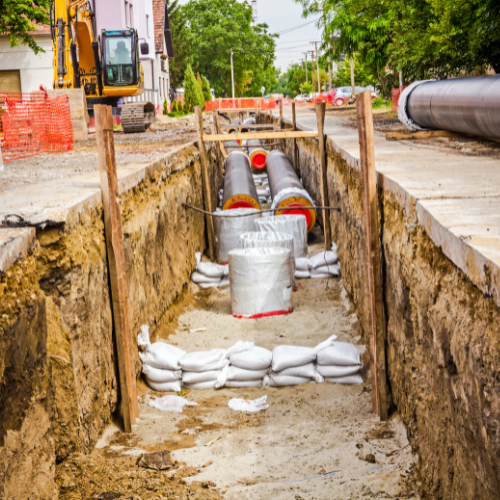
The annual Trench Safety Stand-down (TSSD) Week is scheduled for June 17-23, 2024. This event, started by the National Utility Contractors Association (NUCA), provides an opportunity for employers to speak with their employees about trench safety and the importance of utilizing protective systems (e.g., sloping, shoring, and shielding) to safeguard workers from trenching and excavation hazards. TSSD Week is a part of Trench Safety Month, which runs throughout June.
TSSD Week Overview
A safety stand-down is a voluntary event that allows employers to pause work and speak directly with employees and other parties about safety. TSSD Week seeks to reduce the number of trench-related fatalities and injuries by offering an opportunity to present information about current excavation requirements and safety procedures for working in and around trenches. Employees also have the chance to speak with management about job risks during safety stand-downs. TSSD Week was started in 2016 by the NUCA, and federal OSHA joined as a partner a year later. In 2023, more than 25,800 employees on 2,487 job sites from 455 companies participated in the TSSD.
Who Can Participate in TSSD Week?
Anyone seeking to prevent trenching and excavation hazards on the job can participate in TSSD Week. Those working in or around utility construction, residential construction, highway construction, and military bases and forts are particularly encouraged to participate, as are plumbers, union associations, educational institutions, and safety equipment manufacturers.
Conducting a Safety Stand-down
There is no prescribed way for employers to conduct a safety stand-down. They typically allow employers and employees to take a break from their standard work duties to engage in toolbox talks or other safety activities to draw attention to specific trenching and excavation hazards. Additionally, there is no standard amount of time a safety stand-down must take, and employers are encouraged to plan a safety stand-down time that best fits their workplace. Various English and Spanish fall prevention resources are available on NUCA’s TSSD webpage.
Once the safety stand-down has been completed, employers may provide feedback to NUCA about their TSSD and share details about how and when their stand-down took place. Each company or organization that holds a TSSD will receive a certificate of participation and hard hat stickers for each employee who participated. Recognition will also be provided in NUCA publications.
Employers are responsible for keeping their workers safe and protecting them from trenching and excavation hazards. By participating in TSSD Week, they can demonstrate their commitment to this duty and provide essential safety information to their employees.
Contact us to see how you could minimize risk:
Recent News
Supreme Court Upholds ACA’s Preventive Care Mandate
On June 27, 2025, the U.S. Supreme Court upheld a key ACA provision requiring most health plans to cover preventive services rated A or B by the USPSTF without cost-sharing when provided in-network.
Preventing Tech Support and Internal Help Desk Scams
Cybercriminals often pose as trusted personnel in tech support scams to breach networks, putting small and midsize businesses at higher risk due to limited IT resources.
5 Proven Strategies to Keep Commercial Auto Insurance Premiums in Check
Discover five proven strategies to reduce commercial auto insurance premiums, improve driver safety, and protect your fleet with the right insurance partner.
FMCSA Proposes Ending CDL Self-reporting Rule
On May 30, 2025, the Federal Motor Carrier Safety Administration (FMCSA) proposed to revise its regulations requiring commercial driver’s license (CDL) holders to self-report motor vehicle violations to their state of domicile.
The One Big Beautiful Bill Act and Employee Benefits Changes
President Donald Trump recently signed a major tax and spending bill, commonly referred to as the “One Big Beautiful Bill Act” (OBBB Act), into law.
5 Risks of Hiring an Uninsured Contractor
Project owners and general contractors must verify contractor insurance to ensure safety and avoid legal and financial risks associated with hiring uninsured workers.

